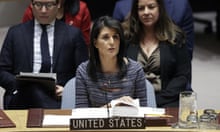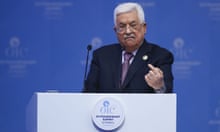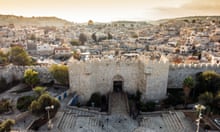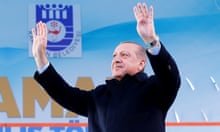A UN security council resolution calling for the withdrawal of Donald Trump’s recognition of Jerusalem as Israel’s capital has been backed by every council member except the US, which used its veto.
The unanimity of the rest of the council was a stark rebuke to the Trump administration over its unilateral move earlier this month, which upended decades of international consensus.
The Egyptian-drafted resolution did not specifically mention the US or Trump but expressed “deep regret at recent decisions concerning the status of Jerusalem”.
A spokesman for the Palestinian president, Mahmoud Abbas, responded to the veto by saying it was “unacceptable and threatens the stability of the international community because it disrespects it”.
The UK and France had indicated in advance that they would would back the text, which demanded that all countries comply with pre-existing UN security council resolutions on Jerusalem, dating back to 1967, including requirements that the city’s final status be decided in direct negotiations between Israel and the Palestinians.
The resolution was denounced in furious language by the US ambassador to the UN, Nikki Haley, who described it as “an insult” that would not be forgotten. “The United States will not be told by any country where we can put our embassy,” she said.
“It’s scandalous to say we are putting back peace efforts,” she added. “The fact that this veto is being done in defence of American sovereignty and in defence of America’s role in the Middle East peace process is not a source of embarrassment for us; it should be an embarrassment to the remainder of the security council.”
The Israeli prime minister, Benjamin Netanyahu, tweeted: “Thank you, Ambassador Haley. On Hanukkah, you spoke like a Maccabi. You lit a candle of truth. You dispel the darkness. One defeated the many. Truth defeated lies. Thank you, President Trump.”
Q&AWhy is recognising Jerusalem as Israel's capital so contentious?
Show
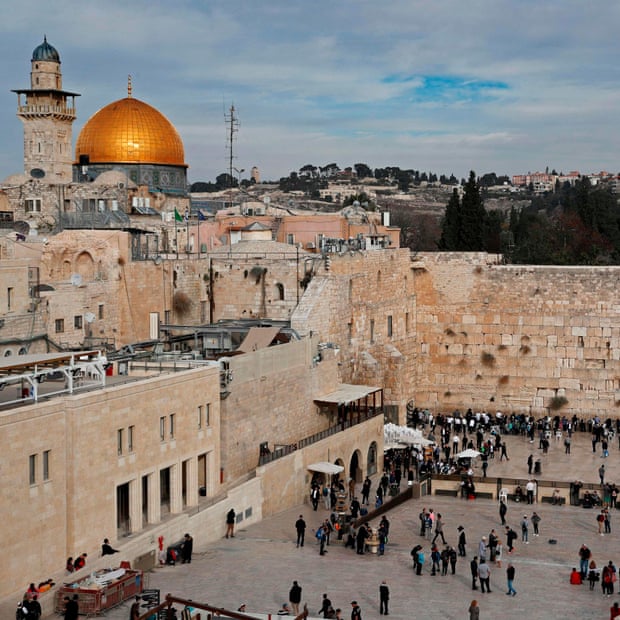
Of all the issues at the heart of the enduring conflict between Israel and the Palestinians, none is as sensitive as the status of Jerusalem. The holy city has been at the centre of peace-making efforts for decades.
Seventy years ago, when the UN voted to partition Palestine into Jewish and Arab states, Jerusalem was defined as a separate entity under international supervision. In the war of 1948 it was divided, like Berlin in the cold war, into western and eastern sectors under Israeli and Jordanian control respectively. Nineteen years later, in June 1967, Israel captured the eastern side, expanded the city’s boundaries and annexed it – an act that was never recognised internationally.
Israel routinely describes the city, with its Jewish, Muslim and Christian holy places, as its “united and eternal” capital. For their part, the Palestinians say East Jerusalem must be the capital of a future independent Palestinian state. The unequivocal international view, accepted by all previous US administrations, is that the city’s status must be addressed in peace negotiations.
Recognising Jerusalem as Israel’s capital puts the US out of step with the rest of the world, and legitimises Israeli settlement-building in the east – considered illegal under international law.
The tabling of the resolution followed a weekend of negotiations aimed at securing the widest consensus possible on the issue. The vote has underlined once again the widespread international opposition to the US move, even among some of its closest allies.
It came ahead of a planned trip by the US vice-president, Mike Pence, to Jerusalem on Wednesday that was set to take place amid a deep rupture in US-Palestinian relations.
However, Pence announced on Monday night that he was postponing the trip until February, citing the imminent congressional votes on tax reform, set to take place in the House and Senate starting on Tuesday. “The vice-president is committed to seeing the tax cut through to the finish line,” his spokeswoman said.
Abbas’s Fatah party has called for a day of demonstrations in the occupied Palestinian territories to coincide with the Pence trip.
Palestinian officials had warned that in the event of a US veto on the security council, they would also seek a resolution at the general assembly.
The push for a vote – which came in the knowledge that the US would use its veto – followed Trump’s decision to overturn decades of policy by declaring that the US recognises Jerusalem as Israel’s capital and that he plans to move its embassy there.
Speaking before the vote, the UK’s ambassador to the UN, Matthew Rycroft, said the text was in line with London’s position on Jerusalem as an issue that must be resolved through negotiations.
In an apparent rejection of the authority of the security council, Israel’s ambassador to the UN, Danny Dann, said before the vote: “Members of the council can vote again and again – a hundred more times. It won’t change the simple fact that Jerusalem is, has been, and always will be the capital of Israel.”
In the immediate aftermath of the US veto, Abbas announced that the Palestinian leadership would move to seek full membership of the United Nations, and try to raise the issue at an emergency meeting of the UN general assembly.
Palestine was admitted to the UN under the same observer status as the Vatican, but the road to full state membership is more complicated than persuading 14 security council members to back existing resolutions on the status of Jerusalem.
While Palestinians would probably get sufficient votes in the UN general assembly, it would first need to secure nine affirmative votes in the security council for the recommendation, with no vetoes.
The Palestinians and their supporters in the UN appear to be attempting to force the Trump administration into using its veto in ways that isolate both Israel and the US, in the hope of drawing in wider international mediation of the peace process.
“It’s a diplomatic battle we are fighting,” one official told the Guardian. “And so far we are having results. It is clear to us that the United States cannot be a mediator and we need international assistance.”
Abbas is expected to visit Saudi Arabia and France this week to rally support.

